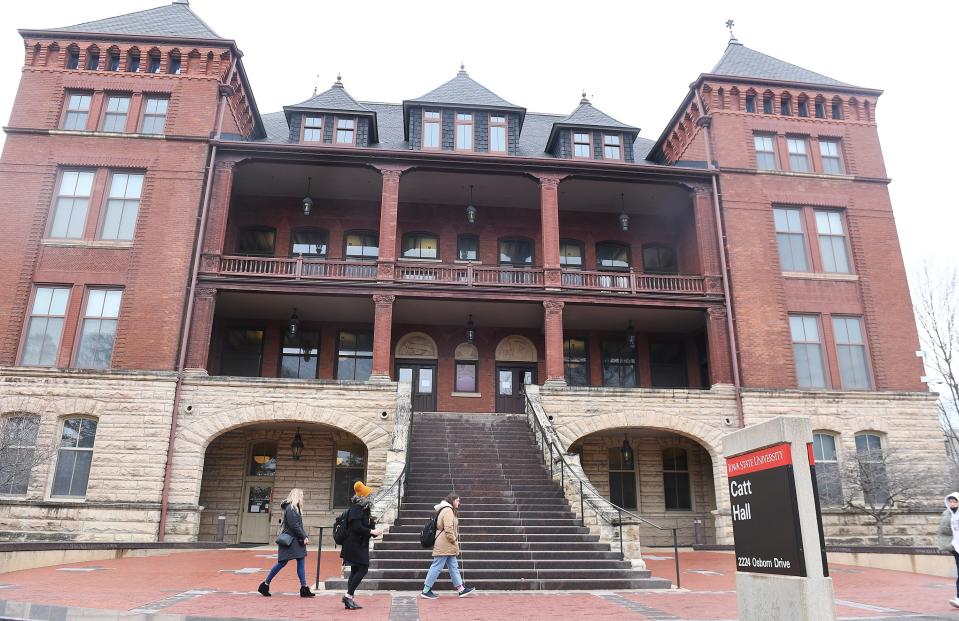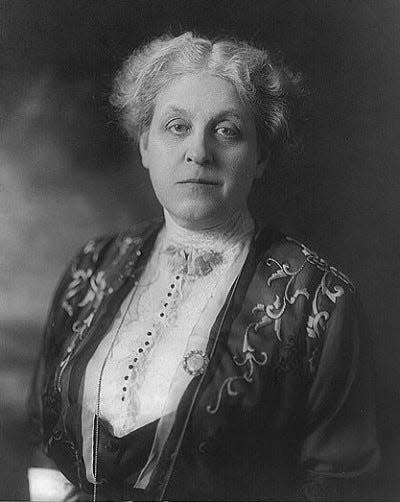Iowa State to keep Catt Hall name amid racial controversy: detailed report unveiled
- Oops!Something went wrong.Please try again later.
An Iowa State University committee voted to keep the name of Carrie Chapman Catt Hall, despite decades of efforts to rename the building that some say is connected to a racist past.
The 15 voting members of the committee for Consideration of Removing Names from University Property voted 11-4 in favor of retaining the name, falling short of the two-thirds vote requirement needed to submit a recommendation for the name's removal. Iowa State president Wendy Wintersteen issued a statement that said she accepted the recommendation.
"The committee has methodically dealt with an extremely complicated task," Wintersteen said. "The committee members had to come to grips with history that is told and understood from differing perspectives across a century. Theirs was an extraordinary commitment of time and effort. With thoughtful consideration of factual and historical materials, the committee deeply examined an important and complex historical figure."

The university published the Catt Hall Review Final Report — a 46-page report detailing not only the history of Catt Hall, but also the building's namesake and student movements both in support for and opposition of the name.
More: Protesters say iconic suffragist embraced white supremacy, demand Iowa State rename Catt Hall
Who was Carrie Chapman Catt?
Catt championed the 19th Amendment to the United States Constitution that gave women the right to vote in 1920. She graduated from Iowa State in 1880 and received an honorary Doctor of Laws degree in 1921, according to the committee's report. Catt succeeded Susan B. Anthony as president of the National American Woman Suffrage Association. She died in 1947.
But Catt also was accused of upholding racist rhetoric in some publications. And protestors on campus in 2020 accused her of upholding white supremacy.
In a collection of essays published in 1917, Catt stated that "white supremacy will be strengthened by women's suffrage," while objecting to a notion that women gaining the right to vote "will increase the Negro vote."
According to the committee's report, the building was established in 1890 and dubbed Agriculture Hall. Departments housed in the building fluctuated, and in 1928 the botany department moved in, which ushered in the name of Botany Hall. After the department moved out, the building was named Old Botany Hall. It wasn't until the summer of 1990 that the Board of Regents approved a request to change the name to Catt Hall.

On Sept. 29, 1995 — one week before Catt Hall was dedicated — Iowa State’s Black Student Alliance published an essay in their newsletter UHURU! titled "The Catt’s Out of the Bag: Was She Racist?"
"At one point the feminist movement was the most fervent advocate of the abolitionist movement," wrote Meron Wondwosen, an Iowa State sophomore and author of the essay. "The two movements support and promote each other's causes. From the white women suffragists' perspective, however, there seemed to be a conflict of interest in the two movements."
Officials from the Carrie Chapman Catt Center for Women and Politics at Iowa State University have critiqued the UHURU! article for depending upon secondary sources.
"It was a difficult situation for the Iowa State University administration because they didn't know where the line was between authenticating the claims made in the article, and challenging the factual basis of a student's work, ” Dianne Bystrom, the center's former director, told the Ames Tribune in 2019.
Iowa State students attempted to name a building after her long before in 1974. At the time, Iowa State's Government of the Student Body passed a resolution formally supporting the renaming of a building in Catt's honor.
According to the report, the resolution stated that "Not only was Ms. Catt active in getting the 19th Amendment to the United States Constitution passed, but (as a student) she helped start the first organized women’s physical activity on the Iowa State campus.”
More: A legacy impossible to forget: Inside the decades-long battle for Jack Trice Stadium's name
Committee members take anonymous vote on renaming
The committee reviewed nearly 250 historical documents from libraries, archives and databases around the country, and interviewed 12 persons with expertise on Catt and events surrounding the building's naming, according to an article on Inside Iowa State.
"The original decision to put Catt’s name on the building recognized the Iowa State alumna who opened the polls to millions of American women, spurred women on four continents to stand up for their rights, and put together international alliances to strive for world peace and equality," the report says in describing the decision.
It said any quotes racists quotes attributed to Catt are "minimal" when compared to the thousands of speeches and hundreds of articles, letters and books she wrote in her lifetime.
"These voluminous records describe the full arc of Catt's life and work, and the recurring themes include equality, democracy, and peace evident in most of her work. Catt condemned anti-semitism, defended Black soldiers in World War I against unfounded charges, condemned the Ku Klux Klan, and raised her voice against Nazi treatment of Jews. She founded the League of Women Voters, open to all women," the report said.
Angie Hunt, Iowa State News Service director, said the committee, made up mostly of university professors, turned to anonymous voting for its decision.
"Given the nearly 30-year history of the Catt Hall naming controversy, committee members agreed to conduct its two votes electronically and keep the individual votes anonymous," Hunt said.
The report cites an initial vote that took place Aug. 25, in which members voted 9-6 — four votes shy of the two-thirds vote requirement to submit a referral for a name change. The final vote was taken Nov. 3.
Members of the committee also received 311 public comments from members of Iowa State's community — all of which were reviewed by committee members before the finalizing of the report.
Nancy Tate, who served as executive director for the League of Women Voters for the United States for 15 years, voiced support for maintaining the name, stating that "Carrie Chapman Catt played a significant role in US history, mainly, but not only, by her years of leadership in expanding the franchise to women," adding that she "strongly (supports) retaining her name on Catt Hall."
Alex Barthel, a junior in industrial design at Iowa State, expressed disappointment with the committee's initial vote, stating that "while Carrie Chapman Catt made much progress for the rights of wealthy white women, her racist remarks and behaviors were dismissive and damaging towards people of color, and her discriminatory legacy isin direct conflict with Iowa State’s mission and ideals."
CLARIFICATION: This story has been updated to clarify that the Carrie Chapman Catt Center’s concerns were focused on the UHURU! article.
Biong M. Biong is a reporter for the Register. Reach him at bbiong@dmreg.com.
This article originally appeared on Des Moines Register: Iowa State to keep Catt Hall name amid racial controversy

